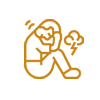Family behavioral therapy
Family behavior therapy (FBT) is an all-inclusive treatment modality used to rebuild the family unit. Addiction and mental health disorders not only hurt you as the individual, but also negatively impact the whole family. Akua’s FREE family program teaches open communication, healthy boundaries, self-control, stimulus-control, conflict resolution skills, employment-seeking skills, and other essential skills needed to maintain a healthy family unit during recovery. Family members meet with the therapist to discuss emotions, thoughts, and negative underlying issues contributing to mental health and substance use disorders.

Play Video
Benefits of family therapy
The National Institute on Drug Abuse highlights the many benefits of family involvement in recovery, including:
- Keeping your loved one engaged and motivated during treatment
- Learning about substance use disorders and their effects on the family and understanding how the treatment works and what to expect when it’s complete
- Improvements in family communication skills
- Enabling family members to voice feelings and concerns and ask questions about a loved one’s addiction
- The chance for family members to develop skills and strategies to help a loved one stay on the path to recovery
- Offering a loved one a high level of appropriate support after treatment
- The opportunity to address any mental health issues within the family system, such as depression or anxiety, can hamper family communication and contribute to relapse
- Easing feelings of fear, anger, stress, and confusion related to addiction


